- Home
- Paul Christopher
Michelangelo's Notebook Page 7
Michelangelo's Notebook Read online
Page 7
He fell, doing a slow half gainer with a twist, screaming all the way down and hitting the same windshield as his knife, going through it instead of bouncing off. The impact cracked the visor on his helmet like a black egg and she saw his face, a young bloody horror, Asian—either Chinese or Vietnamese. He wasn’t moving. Sobbing, half with fear and half with relief, Finn stared down at him, wondering how her life could have changed so quickly and so completely. She slipped the pack on her shoulders again then turned away and headed back along the girder and to the street.
13
Lieutenant Vincent Delaney stood on the sidewalk with his hands stuffed in his pockets, looking up at the building on the corner. The street in front of him was littered with fire trucks, paramedic units and squad cars. Lights were flashing everywhere. There was crime scene tape all over the place and a lot of people in bathrobes and slippers behind it. Most of them had been there for several hours and they weren’t looking too pleased about it. Sergeant William Boyd, his partner, rolled around the corner, two Styrofoam cups of coffee in his hand and a greasy bag held between his teeth like a St. Bernard. He reached Delaney, handed him one of the coffees, then transferred the paper bag to his free hand. He popped the top off his coffee, shook the bag open and offered it to Delaney.
“Doughnut?”
“Sure.” Delaney peered into the bag, found a chocolate glazed and lifted it out. He took a bite, then washed it down with some coffee. Boyd chose a banana cream. Delaney stared up at the building again. The entire top floor was a charred ruin. “What did you find out?”
“Fire started around four thirty. Apparently you can smell gasoline on the fifth floor landing, so it’s definitely arson.” Boyd finished the cream doughnut and dug into the bag for something else. A maple walnut this time. He chewed and slurped.
“Anyone up there?”
“Old guy in 5B. He gets up early so he smelled it first. Called it in and then got out himself. He doesn’t know about 5A. Says the whole back part of the building was where the fire was.” Boyd washed away the last of the maple walnut with the last of his coffee.
“Firemen been in there yet?”
“Yup.”
“Find anything?”
“Nope.” A cinnamon this time. The bag was now empty so he dropped his coffee cup into it, scrunching the whole thing into a sticky wad.
“Your flair for description is amazing, Billy, as is your appetite.”
“Well, they didn’t find anything. You want me to lie?”
“What about the canvassing?”
“The old guy in 5B says he heard someone go down the stairs at a little after two.”
“He see who it was?”
“No.”
“Anything else.”
“The pay phone at the corner.”
“What about it.”
“I had the LUDs checked just in case,” he said, referring to the local use details. “There was a phone call made about two ten.”
“Interesting.”
“Yeah, well, what’s more interesting is where it was made to.”
“Don’t be coy, Billy. It doesn’t suit you.”
“The Coolidge.”
“That flophouse by the bridge?”
“That’s the one. I got a uniform to drive over and talk to the night manager about the call. Turns out the night manager’s behind the counter with his throat slit. About ten minutes later some old wino comes in and says a black devil came through the window of his house and got blood over everything.”
“What the hell’s that supposed to mean?”
“Some Vietnamese punk in black bike gear got tossed off the bridge or something and came through the window of an old Chevy the wino was sleeping in. Messy. Funny thing is, a switchblade was found just outside the car in some weeds.” Billy looked up at the building. “Think there could be a connection?”
“Yeah, Billy, I think there just might be. Maybe we should get over there and take a look.”
They climbed into Delaney’s unmarked Crown Victoria, Boyd behind the wheel, and drove against traffic up Sixth past the looming Village View project to the corner. Delaney glanced out at the phone booth and Boyd gave a whoop on the siren behind the grill, clearing the way across First Avenue. They continued along Sixth Street, Boyd’s big red nose actually twitching as they went by the half dozen restaurants that made up Little India. Doughnuts or tandoori chicken, Boyd welcomed it all with a totally unprejudiced gullet.
The big unmarked G-car swung south down Second Avenue. They reached the corner of Second and Houston and Boyd was about to turn west when Delaney screamed at him.
“Stop the car! It’s her!”
“Who?”
“Just stop the goddamn car, will ya!?”
Just as they’d gone into their turn Delaney had seen a flash of bright red hair coming up out of the Second Avenue subway station on the south side of Houston Street, the figure resolving itself into Finn Ryan. The tires on the Crown Vic screeched in protest as Boyd jammed on the brakes, and for some reason his hand jabbed out and pushed the siren button. The horn whooped and moaned as Delaney wove through the traffic.
Finn turned at the sound and saw Delaney pounding across the six lanes of Houston Street traffic toward her, dodging taxis and delivery vans like a running back trying to avoid being tackled. She stood for one frozen instant at the top of the subway stairs, then turned and ducked down into the darkness again. By the time Delaney reached the south side of Houston Street she was gone. He stood panting at the subway entrance. She was lost and he didn’t have the slightest idea where she was going.
14
Finn rode the F train one stop to Broadway-Lafayette, changed for a downtown G train and then changed again for a Brooklyn-bound 4 train, which she rode all the way down to Bowling Green. She stood rigidly, her hand wrapped around the pole, staring at the doors and not really seeing anything at all or anyone around her. Seeing Delaney had been the last straw. The look of the man as he came hurtling across the street wasn’t that of someone willing to offer a helping hand. He already thought she was somehow implicated in Peter’s death and probably had something to do with Crawley’s murder as well. Adding Raptor Head to the body count wasn’t going to make him any less suspicious even if it had obviously been self-defense. She didn’t even know who the Asian kid was, for crying out loud! Suddenly she was a suspect in multiple murders with cops chasing after her up and down New York streets and into the subway.
The train rolled into the Bowling Green station at the southern tip of Manhattan and Finn snapped out of her fugue. According to the map the next stop was Borough Hall in Brooklyn. She’d had a hard enough time learning how to navigate around Manhattan; this was definitely not the time to start on a new borough. When the doors slid open she stepped out along with a couple of dozen bright young things, male and female, out to make their mark on Wall Street, no doubt.
Finn climbed up to the surface, glanced briefly in the direction of where the Twin Towers had stood, then turned away and crossed over into Battery Park. She found a bench down by the jogging path that ran right around Manhattan’s big toe and stared downriver at the Statue of Liberty, a distant ghost in the morning haze. She stripped off her knapsack, put it on the bench then sat down beside it, curling one long leg underneath herself, thinking out her options.
Her name was Fiona Katherine Ryan from Columbus, Ohio, and she was an art history student at NYU. She’d slept with fewer than half a dozen guys, she liked Häagen-Dazs better than Ben and Jerry’s and she didn’t really believe anything she heard on Howard Stern or saw on Sex and the City reruns. She’d traveled to Italy, spent a little bit of time in Amsterdam and Paris and she’d been well and truly drunk about three times in her life. She didn’t smoke dope or take drugs except for Extra Strength Tylenol when she had especially bad period cramps. She worried about zits in the winter. The biggest secret she had was the knowledge that she would have sex with Johnny Depp in the middle of Times Square i
f he asked her to, which wasn’t likely. She knew she was fairly intelligent, maybe a little smarter than average. She knew she was pretty, but not beautiful, which was fine with her. She liked small animals, especially cats. She didn’t much care for spiders or anchovies.
In other words, she was completely normal. So what was she doing being homeless, chased by cops and guys with great big knives? She was caught in the middle of something but she didn’t have the slightest idea what. All she knew right now is that she wished she smoked. She sighed and stared at the ripply patch in front of her where the waters of the East River and the Hudson met. That was kind of how she felt right now—swept along.
She had a twentieth-century English lit prof they called the Bald Bear because he had hair all over his body and none on his head. He was in his forties, wore argyle socks and shorts to school in the middle of February and talked on endlessly about the Ambler theorem. Eric Ambler was an early thriller writer and all of his books followed the same pattern: an ordinary person suddenly finds him- or herself in an extraordinary, and usually dangerous, set of circumstances. The Bald Bear had all sorts of his own theories about why Ambler wrote this way, but Finn was pretty sure he did it because he knew that spies and murderers weren’t going to be reading his books—ordinary people were, so why not deal them into the game?
Well, that was her, and for the moment she couldn’t see any way out. And in this case it was no game. If she went and handed herself over to Delaney she’d have to start everything by explaining why she ran. She had visions of Law & Order interrogation rooms, being interviewed by Lenny Briscoe and being thrown into some women’s jail. The only other option she could see was simply getting out of town and going back to Columbus. She had a key to the house, a bank account and friends. She could camp out there forever, or at least until her mother got back from the Yucatán or wherever. At least she’d be safe there. Or would she?
Someone had been waiting in her apartment and had slashed Peter’s throat. Probably the same person who had killed Crawley and had tried for her again this morning. She didn’t kid herself that the Asian kid on the bicycle was anything else but hired help. Crazy as it sounded, someone wanted her dead because she’d seen, or simply knew about the drawing from Michelangelo’s notebook, and they weren’t going to stop chasing her now. How difficult would it be to find out who the nude model with the red hair was at the New York Studio School, or Cooper Union? Not to mention NYU. She wouldn’t be difficult to trace back to Columbus at all.
A tug slid by, sending up a muscular-looking bow wave. So what did you do when you were drowning and going down for the third time? You screamed for help, that’s what you did. Finn didn’t have a bullhorn or a whistle but she did have a phone number.
“If it’s really life or death and you can’t get in touch with me for some reason phone this number.” Her mother had given her the longest, dirtiest look ever and then scowled even harder. “And I mean real life or death, sister, or you can come back and finish college here and marry David Weiner.”
The ultimate threat. David Weiner, aka the Weenie, had loved her since he was six years old and still carried a torch for her she could see from Manhattan on clear nights. He had been the only boy in Columbus to throw up during his own bar mitzvah, splashing the rabbi and narrowly missing the Torah he was supposed to be reading from. The Weenie was now a space architect, which wasn’t half as exotic as it sounded. It meant he never actually designed anything; you told him how many people you had to fit into a building and he told you how many toilets you needed and how many cubic feet of air you were going to need so people wouldn’t suffocate. David was, of course, now getting extremely wealthy, but was still dull as plaster drying. He had hair like a scouring pad and feet so big he could walk across Lake Erie and not get his ankles wet.
According to her mother the man at the other end of the phone number had worked with her father. Her mother had said it strangely at the time, as though her father had been something other than a professor of anthropology from Ohio State. Finn had quizzed her, but her mom had clammed right up. The look on her face said it wouldn’t be wise to dig any deeper.
Her mother had used an indelible laundry marker to ink the number onto the inside flap of her knapsack, reversing the number and adding three extra digits to the left and two to the right. When she was finished doing that she made Finn memorize the number until she had it cold. Not the normal mother-henning you expect from a mom sending her daughter off to university, but then Amelia McKenzie Ryan was no normal mother hen. Whatever the case, this was the life and death situation she’d talked about. Finn lifted up her pack and walked back across the park to the pay phone at the edge of the sidewalk. She dug a quarter out of her jeans, dropped it in the slot and punched in the numbers. It rang three times and then anticlimactically it clicked over to an answering machine.
“This is Michael Valentine at Ex Libris, 32 Lispenard Street, New York. We are open by appointment only. Please leave your name, telephone number and any other particulars you want and hopefully I’ll get back to you sometime in the near future. Bye.” There was a beep and then nothing.
“Well, screw you too!” said Finn, racking down the receiver. Appointment only? Hopefully? Sometime? The near future? One thing this Michael Valentine was not, was a businessman. This was the guy who was supposed to help her out of a jam? On the other hand he did have a nice voice; mid-baritone, a little rough around the edges and with a sense of humor lurking in the background somewhere. The kind of person you hoped wound up looking like Al Pacino, except younger and taller. But they never did.
Since she didn’t have the faintest idea where Lispenard Street was she hailed a cab and gave the driver the address. He had no idea where it was either, but at least he had a Hagstrom Five Borough Atlas to consult. After figuring out that it was close by, he did a circle around Beaver Street, went back up Broadway and let her out fifteen blocks later. It turned out Lispenard was a narrow street of old loft buildings that ran for two blocks between Broadway and Sixth Avenue. Halfway down the first block she saw an awning with Michel Angelo’s Pizza on it and wasn’t quite sure what kind of omen that was. The main floors of most of the buildings had been opened as shops, mostly galleries and cafés. Not 32 Lispenard; the windows had been boarded up and then covered with steel shutters all the way up to the roof. The only entrance was a plain gray door with a complicated lock and a faded business card thumbtacked at eye level.
Ex Libris
Antiquaria. Research information.
By appointment only.
Please look at the camera and smile.
The camera turned out to be a small black box the size of a walnut in the upper left-hand corner of the doorframe. She looked up at it, stuck her tongue out and frowned. “How’s that, Mr. Arrogant Prick?” she muttered.
“That’s fine, sweetheart, but I really would appreciate a smile.” The answer came back almost immediately and Finn jumped back, blushing furiously.
“Step closer. You’ve gone out of range of the camera,” said the voice.
Finn stepped forward again. “I phoned you but there was only a message.”
“That’s all there ever is. The number’s unlisted. How did you get it?”
“Uh, my mother gave it to me.”
“Your mother’s name is ‘Uh’?”
“My mother’s name is Amelia McKenzie Ryan.”
There was a brief silence. “Your dad was Lyman Andrew Ryan?”
“That’s right.”
“He had a nickname.”
“That’s right. He did.”
“Tell it to me.”
“Why should I?”
“Because if you don’t, I won’t open the door so you can tell me your problem.”
“Why do you think I have a problem?”
“Don’t be irritating. Your mother didn’t give you this number because she thought you and I might sit around and have tea together. She gave it to you for extreme emergencies.”
“Buck.”
“Good girl. That makes you Fiona.”
“Finn. And I’m not a girl.”
“You’re not a boy—that’s for sure.” There was a buzzing sound and the door popped open. “You’ll see a freight elevator at the end of the hall. Take it. Press five. Close the door firmly behind you, please.”
Finn did as she was told, making sure the door was shut tight. She walked down a narrow hall, brick on the left side, unpainted sheetrock on the other. She reached the oversized freight elevator, stepped in and pulled the knotted rope that brought the gate down. She pressed five on the old black control panel and the elevator began to creak its way upward.

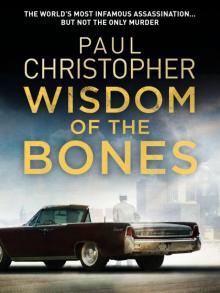 Wisdom of the Bones
Wisdom of the Bones The House of Special Purpose
The House of Special Purpose The Second Assassin
The Second Assassin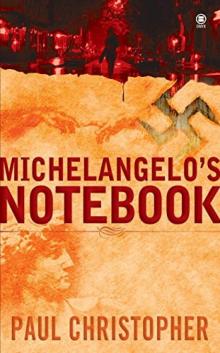 Michelangelo's Notebook
Michelangelo's Notebook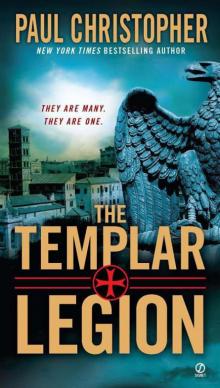 Templar Legion
Templar Legion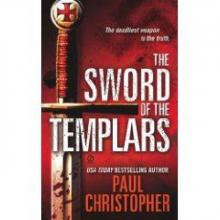 The Sword of the Templars t-1
The Sword of the Templars t-1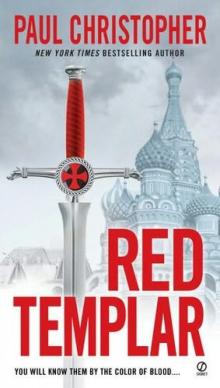 Red Templar
Red Templar The Aztec Heresy
The Aztec Heresy The Templar Legion
The Templar Legion Rembrandt's Ghost
Rembrandt's Ghost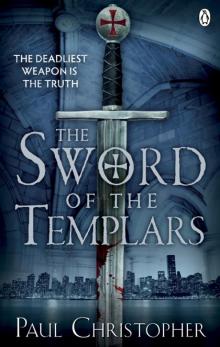 Sword of the Templars
Sword of the Templars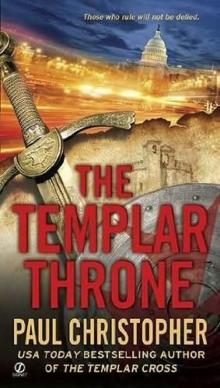 The Templar throne t-3
The Templar throne t-3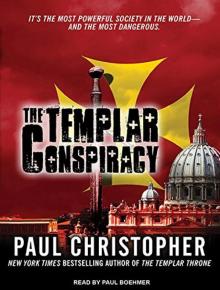 The Templar Conspiracy
The Templar Conspiracy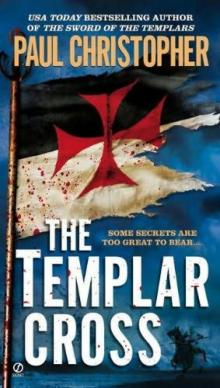 The Templar Cross t-2
The Templar Cross t-2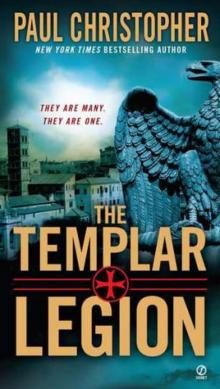 The Templar Legion t-5
The Templar Legion t-5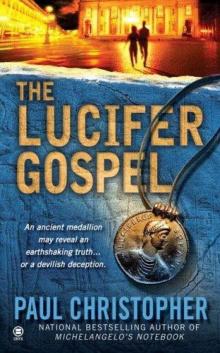 The Lucifer Gospel
The Lucifer Gospel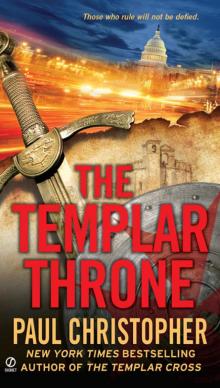 Templar Throne
Templar Throne Michelangelo_s Notebook fr-1
Michelangelo_s Notebook fr-1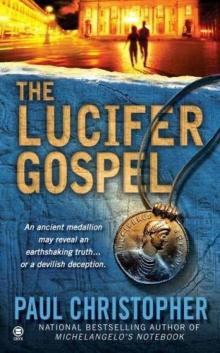 The Lucifer Gospel fr-2
The Lucifer Gospel fr-2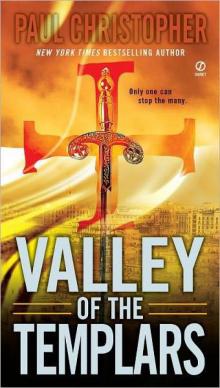 Valley of the Templars ts-7
Valley of the Templars ts-7 Valley of the Templars
Valley of the Templars Templar Cross
Templar Cross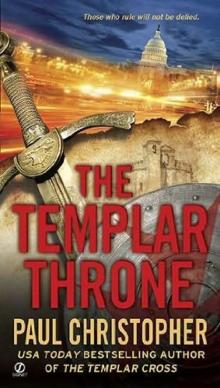 The Templar Throne
The Templar Throne The Templar Cross
The Templar Cross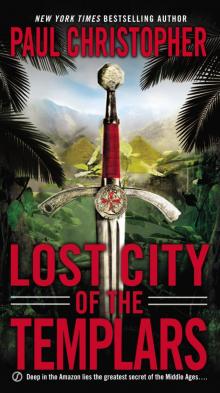 Lost City of the Templars
Lost City of the Templars The Templar conspiracy t-4
The Templar conspiracy t-4 Templar Conspiracy
Templar Conspiracy